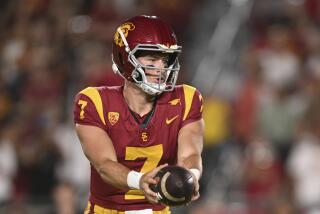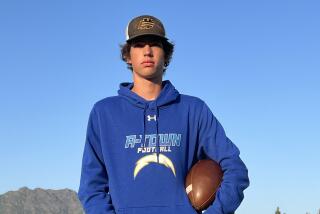Curveballs Chased Him Onto Campus
- Share via
TALLAHASSEE, Fla. — Rodney Dangerfield was a hoot when he went “Back to School” in the movies, but then he never threw six interceptions against North Carolina State, did he?
Long before 26-year-old sophomore quarterback Chris Weinke’s disastrous “Football Giveaway Night!” Sept. 12 in Florida State’s stunning 24-7 loss to the Wolfpack--his second football start since high school in 1989--Weinke sometimes wondered what a man with a Yogi Berra hairline and a million dollars in the bank was doing pinned between fraternity pledges in Biology 101.
“There were times when I said, ‘What the hell am I doing here?’ ” Weinke said in a recent interview. “Believe me. When I was up writing a term paper at night, I’d say, ‘What in the hell am I doing?’ ”
Remember how tough it was getting back in the school swing after summer vacation?
Imagine the cobwebs after seven summers off.
“To be honest, I don’t even remember my first day of classes,” Weinke said. “It was a blur.”
Weinke returned to Florida State last year after cashing a promissory note from Coach Bobby Bowden.
Weinke, a prized 1990 recruit from Cretin-Derham Hall High in St. Paul, Minn., accepted a scholarship at FSU, then decided to pursue a career with the Toronto Blue Jays. Bowden wrote Weinke a nice note, saying a scholarship was waiting if baseball didn’t work out.
“They ride that bus night and day, hit .250 in Class C, do all that stuff, face that curveball, and about a year and a half later they’re calling me,” said Bowden, who had written such notes before. But Bowden never expected Weinke would come calling six years later.
“I did mean it,” Bowden said of his promise. “But I never thought it would work out.”
It worked out.
When projected starter Dan Kendra tore knee ligaments in spring practice, Weinke, who turned 26 on July 31, became top dog at one of the nation’s most prestigious college football programs.
As Weinke prepares to play USC on Saturday in Tallahassee, it’s safe to say this has been one of the more curious dramas to play out in Bowden’s 23 seasons in Tallahassee.
Bowden has always calculated experience into the quarterback position, traditionally starting only red-shirt juniors. Yet, two weeks before the opener, Bowden sat in his office and stroked his chin.
“It’s as bizarre as it can be,” Bowden said of the Weinke situation. “I’m looking out there, watching us practice and thinking, ‘There’s a quarterback that’s never started a [college] game. Never started a ballgame! And I’m confident. What’s wrong with me?’ ”
Bowden poked the fruit on his lunch plate and pondered this football fork in the road.
“He’s so much older and [more] mature than all the guys,” he said. “But he’s still inexperienced, and you can’t coach experience. He has to go out there and get it.”
Oh, Weinke got it.
After squeezing out an opening victory against Texas A&M; in the Kickoff Classic, the wheels came off Weinke’s cart in the ghastly, six-interception game against North Carolina State.
Yet, Bowden assessed correctly that Weinke’s six years in the rough-and-tumble world of minor league baseball had sufficiently thickened the quarterback’s skin.
“There’ll be people who want to run me out of town,” Weinke told reporters after the North Carolina State game. “I know that. There’s going to be a lot of criticism. There’ll be a lot of blame put on me. And I accept that. But I’m not going to let people run me out of this game.”
With his job on the line, Weinke rebounded strongly in Florida State’s 62-13 rout of Duke, completing 11 of 19 passes for 241 yards and three touchdowns, with no interceptions.
Weinke said he was moved by the resounding ovation he received from Doak Campbell Stadium fans before his first home start.
Maybe getting out of baseball wasn’t a bad idea.
Weinke had his share of bush-league highlights, rising as high as triple A in the Toronto chain. No one can take the memory of going one for two against Roger Clemens, who was on a rehabilitation assignment, or of facing David Cone in spring training.
And nothing could top April 10, 1994, in Hoover, Ala., when Michael Jordan of the Birmingham Barons stroked his first minor league hit against Weinke’s Knoxville club.
“I was playing first base,” Weinke said. “that’s my claim to fame. He came down to first and said, ‘I’d better get the ball because I don’t know if I’ll ever get another hit,’ and they stopped the game and got him the ball.”
Weinke was shocked when Jordan arrived at the bag and said, “Hi Chris.”
“The one thing I’ll always remember about him is that he called everybody by their first names,” Weinke said. “He was unbelievable. I was just so amazed a guy of his caliber would take the time to want to do that.”
As baseball players, Weinke and Jordan had one thing in common: Neither could hit a curveball.
In a career spanning 750 games over six seasons, Weinke batted .246 with 70 home runs and 413 runs batted in.
He remembers staring at the television set Jan. 1, 1994, the night Florida State clinched the national title with its 18-16 Orange Bowl victory over Nebraska.
“I was kicking myself in the butt,” Weinke said. “I remember saying, ‘That could have been me.’ ”
After batting .186 in an injury-plagued 1996 season at triple-A Syracuse, Weinke figured it was now or never.
“The college football blood was still running through me,” Weinke said. “That’s why I came back. But I also came back because I was playing with guys in double A who were 35 years old and had no education. And, really, baseball is ruthless. They can cut you in a heartbeat. I didn’t want to be a guy who spent 10, 12 years in the minor leagues and just kept trying to hook on with somebody, then, when I got married and had kids, what was I going to do with my life?”
Weinke asked his high school coach, Rich Kallock, to put out some football feelers.
Weinke then attended Florida State’s game against Clemson in Tallahassee on Oct. 5, 1996, arranging a meeting with Bowden to see if the coach’s scholarship offer was still on the table.
It was.
“Same guy, six years later,” Bowden summed up the 6-foot-5, 240-pound Weinke.
Weinke’s NCAA clock never started in 1990 because he’d spent only four days on campus, leaving before classes started, meaning he had four years of eligibility.
So Weinke enrolled at Florida State in the fall of 1997 as a 25-year-old, independently wealthy freshman.
This year, as college athletes consider an NCAA rule that allows them to earn $2,000 during the school year, Weinke is giving Florida State coaches investment tips.
Weinke made a considerable profit when he invested a chunk of his $400,000 baseball signing bonus in Minnesota real estate.
No, Weinke is not your typical sophomore.
He has rebuffed offers to join a fraternity--single, he shares a five-bedroom Tallahassee home with three Seminole offensive linemen--and says he has not attended one school social function outside football.
Taking freshman classes with 17-year-olds, Weinke parked himself in the back of the room and never said a word.
“It wasn’t like I was hanging out with those kids,” he said.
Weinke spent his freshman football season last fall in a back-to-school haze, throwing only 13 passes, mopping up for starting quarterback Thad Busby.
“I could sort of sit back and absorb, like a sponge, everything around me.” Weinke said. “That was an advantage.”
In many ways, Weinke was far better positioned the second time around.
In 1990, Florida State already had quarterbacks Brad Johnson and Casey Weldon on the roster and were welcoming a redshirt freshman by the name of Charlie Ward.
“I would have had to battle him,” Weinke said of Ward, who led the Seminoles to their 1993 championship. “I may never have been a starter. . . . Or, I might have won the Heisman Trophy.”
Bowden also wonders what might have been.
Ward, the 1993 Heisman Trophy winner and current New York Knick, also starred for the Seminoles in basketball.
“Sometimes he’d be a week late for spring training, because of basketball,” Bowden said of Ward. “It could be that Weinke could have gotten the jump. You never know.”
If Weinke exhausts his eligibility, he’ll be a 28-year-old senior, which would assuredly make him the oldest college player east of Provo, Utah.
Yet, Weinke says he probably will play only this year and next, at which time he plans to take his degree in sports management and move on.
“I came in with a sense of urgency,” Weinke said. “If I have a chance to play on the next level, that would be great. If not, I’ll have my college degree.”
Up Next for USC
at Florida State, Saturday, 12:30
More to Read
Go beyond the scoreboard
Get the latest on L.A.'s teams in the daily Sports Report newsletter.
You may occasionally receive promotional content from the Los Angeles Times.











